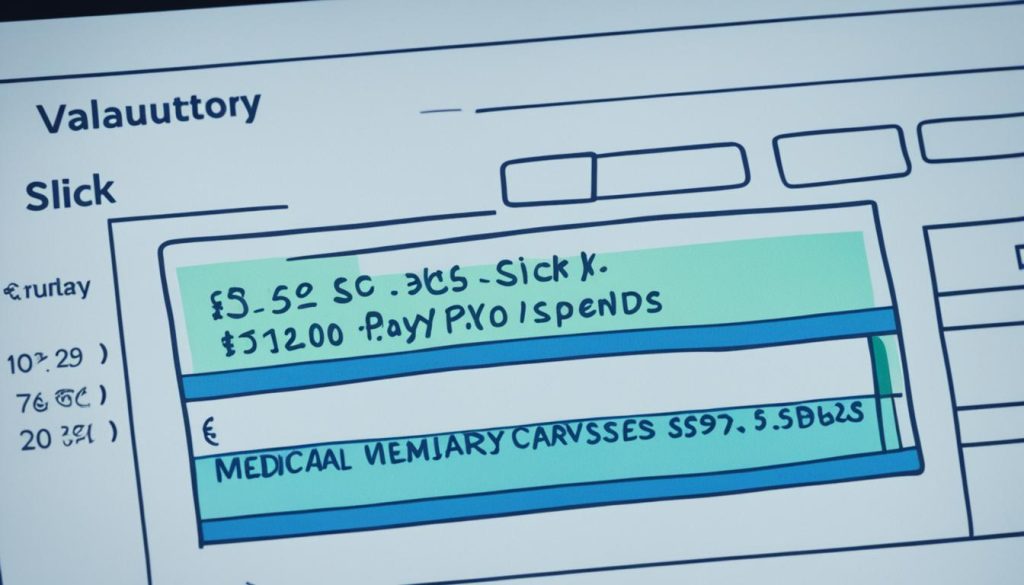If you work in the UK and can’t work due to illness or injury, you might get Statutory Sick Pay (SSP). This pay is set by the government to help workers who are sick. But, what is the daily amount of statutory sick pay in the UK? We’ll look into SSP, including who can get it, how it’s worked out, and what affects your daily pay.
Statutory Sick Pay is key for workers who need time off for health reasons. Knowing how it works helps you get the right sick pay and manage your time off better. This info is useful for both business owners and employees. It keeps you updated on your rights and what you need to know about Statutory Sick Pay.
Understanding Statutory Sick Pay in the UK
In the UK, Statutory Sick Pay (SSP) is a key rule that makes sure employees get a basic income when they’re too sick to work. It’s a government benefit that helps workers during sickness. It’s important for employers and employees to know the rules and who can get it.
What is Statutory Sick Pay?
Statutory Sick Pay (SSP) is a payment employers must give to eligible employees who can’t work because they’re sick or injured. It’s the lowest amount you can get and aims to lessen the blow of missing work. The statutory sick pay regulations explain who gets it and how.
Eligibility Criteria for Statutory Sick Pay
To get Statutory Sick Pay, you must:
- Be an employee, not self-employed or a contractor
- Make at least the minimum sick pay requirements set by the government (currently £123 per week)
- Be sick for at least four days in a row, including weekends and bank holidays
- Tell your employer about your sickness on time, as they say
- Give a valid fit note from a doctor if you’re out for more than seven days
Employers check if you’re eligible and make sure the statutory sick pay rules are followed.

“Statutory Sick Pay is a crucial safety net for workers, providing a minimum level of income during periods of illness or injury. Understanding the eligibility criteria and regulations is essential for both employers and employees.”
Calculating Statutory Sick Pay Per Day
Figuring out the daily Statutory Sick Pay (SSP) in the UK is easy. It depends on the employee’s average weekly earnings and the government’s SSP rate.
To work out the daily SSP, just follow these steps:
- First, find out the employee’s average weekly earnings. This is done by looking at their pay over the last 8 weeks before they got sick.
- Then, divide their average weekly earnings by the number of days they work in a week, usually 5 (Monday to Friday).
- Finally, multiply the result by the SSP rate for the week, which is £99.35 as of April 2023.
Let’s look at an example:
| Calculation Step | Value |
|---|---|
| Average weekly earnings | £500 |
| Divide by qualifying days per week | £500 / 5 = £100 |
| Multiply by current SSP rate | £100 x £99.35 = £99.35 |
| Statutory Sick Pay per day | £99.35 |
An employee earning £500 a week would get £99.35 a day in Statutory Sick Pay, using the current rate.
“Ensuring accurate calculations of Statutory Sick Pay is crucial for both employers and employees to understand their rights and obligations.”
The SSP rate can change, so employers should always check the latest government advice when paying their employees.

Key Factors Affecting Statutory Sick Pay Rates
The amount of Statutory Sick Pay (SSP) you get in the UK depends on several important factors. It’s key to know these to make sure you get the right pay and use your sick pay rights.
Employment Status and Earnings
Your job status and how much you earn affect your SSP rate. To get SSP, you must earn at least £123 a week on average. Your SSP is based on your weekly earnings, with a top rate of £99.35 a week.
Length of Sickness Absence
How long you’re off sick also changes how much SSP you get. You can get SSP for up to 28 weeks of being sick. After that, you might get other support like Employment and Support Allowance. The first three days don’t count towards SSP.
If you’re off sick several times in a year, you might not get SSP for as long. This is because the 28-week limit is for the whole time you’re sick, not each spell.
“Understanding the key factors that influence Statutory Sick Pay rates is essential for employees to ensure they receive the correct entitlement and exercise their rights.”
Statutory Sick Pay Entitlement and Limits
In the United Kingdom, the government sets rules for Statutory Sick Pay (SSP) to help employees during illness or injury. It’s important for employers and workers to know these rules well.
Eligible employees can get £99.35 a day or £96.35 a week in SSP. This amount can change each year. They can claim SSP for up to 28 weeks, then might get other benefits like Employment and Support Allowance.
Some people might not get SSP, like those working less than 3 months or earning under £123 a week. Some health conditions or treatments might also affect their SSP amount.
Employers must make sure their staff get the minimum statutory sick pay they deserve. Keeping up with the latest rules and records helps them meet their legal duties. This support is key for employees during illness or incapacity.
“Statutory Sick Pay is a vital safety net for employees, ensuring they can focus on their recovery without the added stress of financial hardship.”
The UK has clear rules for statutory sick pay entitlement uk, like minimum and maximum amounts and claim duration. It’s vital for employers and employees to understand these to ensure fair treatment during sickness.
How Much is Statutory Sick Pay Per Day?
In the United Kingdom, statutory sick pay (SSP) is key for employees needing time off for illness or injury. The SSP rate per day is £99.35, which is £696.45 per week. This is for eligible employees off work for four or more days straight.
The UK government sets the daily SSP rate, which changes yearly. Employees get this amount for each day they’re sick, if they meet the rules. Let’s explore how the SSP rate is figured out and what affects it.
Calculating the Statutory Sick Pay Rate Per Day
The daily SSP rate comes from a weekly rate divided by the number of sick days in a week. With a weekly rate of £96.35 and 7 sick days, it’s £99.35 per day.
Remember, the SSP rate can change. Always check the latest info on the government’s website or with your employer to get the right amount.
Factors Affecting the Statutory Sick Pay Rate
- Employment status: You must work for your employer for at least 4 weeks and earn at least £123 a week to get SSP.
- Length of sickness absence: You can get SSP for up to 28 weeks of being sick. After that, you might get Universal Credit or Employment and Support Allowance.
Knowing about the SSP rate and what affects it helps employees plan for sickness. This way, they can get the support they’re due while out sick.
Employer Responsibilities and Obligations
In the United Kingdom, employers have clear duties when it comes to Statutory Sick Pay (SSP). It’s vital for both employers and employees to know these duties. This ensures SSP is given out correctly.
Record-Keeping and Payroll Procedures
Employers must keep detailed records of when employees are off sick. These records should include the dates they couldn’t work because they were too ill. These records should be kept for at least three years. They might be needed to check if an employee is eligible for SSP or to settle any disputes.
Employers also need to handle SSP payments through their payroll. This means working out the right SSP amount, taking off taxes and National Insurance, and making sure payments go to the right people on time.
| Employer Responsibilities for Statutory Sick Pay | Key Requirements |
|---|---|
| Record-Keeping |
|
| Payroll Processing |
|
| Compliance with Legislation |
|
Employers must follow the SSP rules and laws. This means they must check if employees are eligible, pay the right amount, and follow all legal rules for SSP.
“Employers play a crucial role in the effective implementation of the statutory sick pay system, ensuring that eligible employees receive their full entitlement.”
By doing their part, employers support their team when they’re sick. This helps everyone’s health and happiness at work.
Employee Rights and Statutory Sick Pay
In the United Kingdom, employees have certain rights and protections related to Statutory Sick Pay (SSP). It’s important to know these rights to get the right sick pay benefits if you’re off work due to illness or injury.
Appealing Denied or Incorrect Payments
If your employer doesn’t give you employee sick pay rights or gives you the wrong statutory sick pay amount, you can appeal. Here’s what you need to do:
- Write to your employer explaining why you think the decision is wrong and give any evidence you have.
- If your employer still says no, you can take your case to HM Revenue and Customs (HMRC). They handle statutory sick pay eligibility.
- HMRC will look into your case and make a final decision on your appealing statutory sick pay claim.
When appealing SSP decisions, you must act fast. You usually have 28 days from when your employer made their decision to start the appeal.
| Scenario | Employee Action | Employer Responsibility |
|---|---|---|
| Denied SSP claim | Appeal in writing to employer | Provide detailed explanation for denial |
| Incorrect SSP amount | Appeal in writing to employer | Review calculations and correct any errors |
| Unresolved appeal | Escalate to HMRC for review | Cooperate with HMRC investigation |
Knowing your employee sick pay rights and how to appeal for statutory sick pay helps you get the benefits you deserve when you’re sick or injured.
Conclusion
This article has given a full look at Statutory Sick Pay in the UK. It covered the daily rate, who can get it, how it’s worked out, and how much you can get. It also talked about what employers and employees need to know.
If you have more questions about statutory sick pay, talk to your employer or check government websites. Knowing what you’re entitled to and how it works can make things easier. It helps you get the statutory sick pay per day you should have when you’re sick.
Reading this article has given you the info you need to stand up for your rights. You’ll know how to get the statutory sick pay support you’re due. This can give you peace of mind and help with your finances if you have to take time off for health reasons.
FAQ
How is Statutory Sick Pay calculated?
The government sets a formula for calculating Statutory Sick Pay. Right now, it’s £99.35 per week, or £14.20 per day. Your pay could change based on your earnings and how long you’re sick.
What factors affect the Statutory Sick Pay rate?
Your job status, earnings, and how long you’re sick can change the Statutory Sick Pay rate. If you earn more and are sick for a longer time, you might get more SSP.
What are the entitlements and limits for Statutory Sick Pay?
You can get up to £99.35 per week in Statutory Sick Pay, for up to 28 weeks. You must earn at least £14.20 per day (based on a 7-day week). Some might get more if they usually earn more.
What are an employer’s responsibilities for Statutory Sick Pay?
Employers must keep accurate records, handle SSP payments through payroll, and follow the law. They also need to tell employees about their SSP rights and entitlements.
What rights do employees have regarding Statutory Sick Pay?
Employees have the right to get the correct Statutory Sick Pay. They can appeal if payments are denied or incorrect. They should know the rules and how to claim SSP from their employer.




